You are in:
- Fundació TMB
- TMB Education
- Activities for schools
Activities for schools
We offer educational activities for formal education centres, including Special Education, Infants (3-6 years), Primary (6-12 years), Compulsory Secondary Education (12-16 years), Voluntary Secondary Education (16-18 years), Vocational Training (16-18 years) and universities.
We also offer activities for social groups that need special care, through day centres, drop-in centres, NGOs, adult education centres, charities for the disabled, community centres, etc.
- Our activities are free.
- The approximate duration of all activities is one hour and thirty minutes.
- To make a reservation, go to the contact form. For any queries, call 93 298 72 66.
Video showcasing TMB Education activities (CA) (4:39)
Station visit for younger children
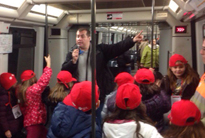
Activity for infant I5 and primary schoolchildren. A guided tour of a metro station near the school (chosen by the teachers) allows pupils to learn about the station and its surroundings.
Visit to the Metro control centre
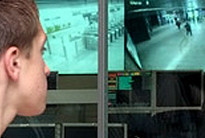
Activity aimed at students in the first and second stages of compulsory secondary education (ESO). A guided tour of the Metro Control Centre gives students the opportunity to find out how this centre operates and its role in regulating the frequency of trains on the line and their safety.
Visit to the Bus Control Centre
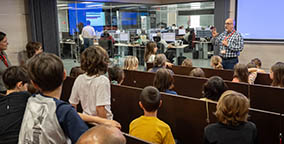
Activity aimed at students in the first and second stages of compulsory secondary education (ESO). A guided tour of the Traffic Regulation Centre gives students the opportunity to find out how the bus network is controlled and learn about the centre’s role in regulating the frequency of buses and their safety.
New technologies and transport
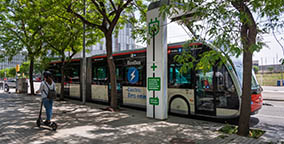
Aimed at students in voluntary secondary education and vocational training. Students are awareness of the importance of public transport for the sustainable and safe movement of people. They also learn about the work done by TMB in seeking alternative energy sources.
Let's go to Montjuïc on public transport
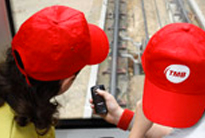
Activity aimed at students in the middle and last stages of primary education. Pupils on a guided tour learn about the Montjuïc funicular railway and cable car and the service this unique infrastructure provides to the public.
Plan your jounney
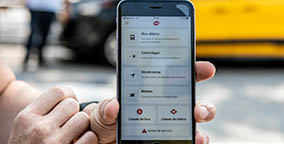
Activity aimed at the first and second cycle of compulsory secondary education (ESO). Students learn to get the most out of new technologies through the tools that TMB offers to prepare their journeys by public transport.
A journey through the history of public transport
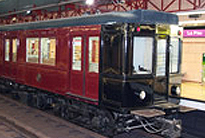
Activity aimed at high school students and training cycles. The visit consists of a journey through more than a hundred years of public transport history in Barcelona, the digital resource of the Crònica d’un viaje or other audiovisual material.
Let's know authomated metro lines
Activity aimed at students in te middle and last stage of primary education. Throug a guided visit of an authomated metro station pupils learn about how the station, the environment and the different elements work.
We are driven by diversity
Program to talk about difference, focusing on opening new paths towards the normalization of diversity. We seek to promote joint reflection, breaking down barriers, prejudices and social stereotypes. We want, in a dynamic and participative way, to work on respect and tolerance in the face of any situation that violates human rights and attacks people's dignity.
A metro for everyone
Activity aimed at upper primary and compulsory secondary education students with the aim of raising awareness of the work of the metro intervention groups
Talent in motion
Workshop proposed for 3rd and 4th ESO students, where, through classroom talks or guided visits to our centers, we give the opportunity to learn about our activity at TMB, the set of professions that are within our companies and the range of opportunities we can offer to people who want to come and work with us.
Talent in motion aims to be a workshop that helps to broaden the view, invites reflection, and promotes thinking free of stereotypes.
Security in the metro
Activity aimed at upper primary and compulsory secondary school students. In this session, different situations that can endanger people's integrity are explained, and a dialogue is created with the visiting group to invite debate.
Let's go to the station. NEW ACTIVITY!
Digital activity
First digital activity from TMB Educa aimed at Primary School students, consisting of a virtual clue-based game through which children learn the main rules of use and coexistence in the metro. This activity can be carried out independently or as a complement to an in-person visit.









